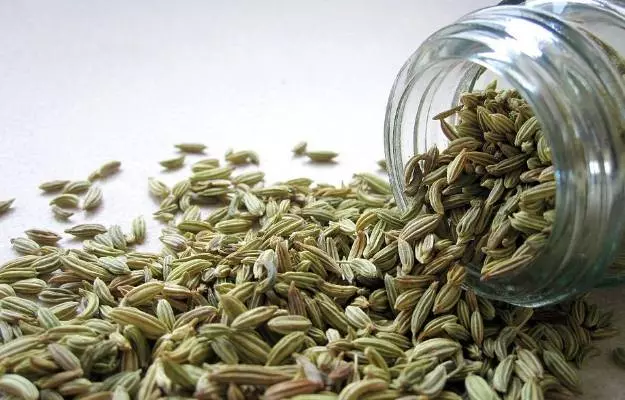Fennel seed is a savoury spice that looks quite similar to but it is a bit sweeter than cumin seeds. Obtained from the fennel plant, these seeds are generally green or brown in colour. There might not be an Indian home that isn’t aware of the warm and sweet aroma of fennel seeds. In fact, Indians use fennel seeds extensively in both sweet and savoury dishes. Roasted fennel seeds are an important ingredient in mukhwas, a popular after-meal mouth freshener in India. In South India, people make fennel water out of these seeds, which is considered good for digestion. In Eastern India, fennel seeds are used as one of the main ingredients in a type of spice mixture called panch phoron. It is also used widely in North India, especially in Kashmir and Gujarat.
Fennel is native to the Mediterranean region. It was initially cultivated by the Greeks from where it spread to the rest of the Europe.. Later, owing to its medicinal properties, fennel seeds spread to the other parts of the world. Presently, the largest cultivator of fennel seeds is India. Other fennel producing countries include Russia, Romania, Germany and France.
Most cooking enthusiasts are quite aware of fennel seed usage, but do you know that the entire fennel plant can be used for different purposes. The flowers and leaves can be used for garnishing, the leaves and stalks are used in salads and as sprinklers on pizzas. Dried fennel fruit is usually chewed to increase the production of saliva. It is also used as a flavouring in alcohols, soups, sauces, meat items, and pastries.
Just when you think that’s all, these seeds have several medicinal uses too. Fennel seeds are primarily used as antacids and as a mouth freshener to keep off bad breath. Boiled fennel seeds and their broth can help get rid of flatulence and aid weight loss. Fennel seeds can also be used as a painkiller and for reducing swelling. Additionally, these seeds are considered to be good for eyes.
If you are tired of dieting and exercising and are not able to lose weight, then use myUpchar Ayurveda Medarodh Fat Burner Capsule, it has no side effects, order it today and avail the benefits.
Let us have a look at the nutritional and healing miracle that are fennel seeds.
Basic Facts about Fennel Seeds:
- Botanical name: Foeniculum vulgare
- Family: Apiaceae
- Common Name: Saunf
- Sanskrit name: Madhurika
- Parts used: Seeds, stalks, leaves, flowers, bulbs
- Native region and geographical distribution: Fennel is cultivated all over the world. India accounts for about 60% of the total world production of fennel. Major fennel seeds producing states in India include Rajasthan, Madhya Pradesh, Andhra Pradesh, Telangana, Karnataka, Punjab, Uttar Pradesh and Haryana
- Interesting facts: Fennel seeds are also referred to as the ‘meeting seeds’ because in the olden days, people used to carry these seeds to munch on them during long church services.













